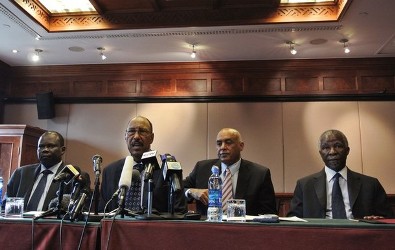Sudan, S. Sudan adopt ‘strategic’ approach to resolve disputed issues
July 7, 2012 (KHARTOUM/JUBA) – Sudan and South Sudan’s delegations in Addis Ababa endorsed with some optimism a new strategic approach to facilitate quick progress in the stalled talks when they resume next week, the two parties announced.

Also, the chief negotiator, Thabo Mbeki, arrived in Khartoum where he met President Omer al-Bashir to discuss the prospects of the talks in the upcoming weeks as the parties are tied by a United Nations (UN) resolution demanding that they conclude the process before the 2 August 2012.
Briefing the media after his arrival in Khartoum, Sudan’s defence minister who chairs the Sudanese delegation to the Joint Political and Security Mechanism, Abdel-Rahim Hussein spoke with certain optimism about the comprehensive strategic approach.
He told reporters that this approach is based on three principles:
1. Commitment to the non-aggression pact.
2. Non-interference in the internal affairs.
3. Transparency and good faith in their joint cooperation to resolve the outstanding issues.
“As members of South Sudan’s negotiating team, we strongly believe that the comprehensive strategic approach, which was also endorsed our President [Salva Kiir] will offer new solutions to resolving the outstanding post-independence issues,” Pagan Amum told a media briefing on arrival from Addis Ababa.
The new approach, he added, will mainly focus on the establishing a demilitarized buffer zone along their troubled border restarted, in addition to others as mandated by both the African Union (AU) roadmap and the United Nations Security Council (UNSC) resolution 2026.
The implementation of security arrangements agreed by the two countries since November last year was a key issue to pave the way for comprehensive solution for the outstanding issues. However, the difference over a map demarcating the buffer zone hampered the process.
The issue of the presence of rebel groups from both sides is seen, in Khartoum, as main factor obstructing efforts to build confidence and break the deadlock in the talks.
Abdel Rahim said this approach will allow the two sides to address security issues and to coordinate their efforts on the political, diplomatic and security fields and to take tough decisions on the basis of common interests of the two countries.
Speaking about the UNSC resolution 2046 and the delay in the talks as the deadline of 2 August is approaching, Hussein said the aim of the decision was to prevent the escalation of violence and war between the two countries.
He pointed out that the new strategy decreases the tension and the purpose of the resolution is achieved.
Meanwhile, Amum blamed the AU mediation team for the delay in the talks saying it did not invite the two parties early enough for resumption of discussions.
“Up to now, the two delegations have not yet been invited to discuss the key outstanding issues between them and this may negatively impact on the fast approaching deadline,” Amum said.
He said the next round of talks will require renewed ‘positive thinking’ and ‘tough decisions’ if a viable solution is to be reached on resolving the issues at hand.
Speaking to the media in Khartoum after his arrival, Mbeki congratulated the two sides for reaching this strategic approach.
He stressed that it will allow the two parties to tackle the outstanding issues taking into account the deadline determined by the AU roadmap and the resolution 2046.
The Elders, an independent group of global leaders, on Friday expressed concerns about the deadline for ending the talks, encouraging the two parties to expedite the process that could witness two viable states living side by side with each other.
BASHIR SALVA KIIR MEETING?
The minister Abdel-Rahim however told reporters that the presidential summit might not take place as expected on the sidelines of the AU meeting.
He pointed out that the necessary arrangements have not yet being done, but he stressed that the preparations were taking place to hold it.
Mbeki also minimised the importance of such summit for the time being. He said such meeting should be organised after good preparation, adding it should not be for consumption through the media but only to reach radical solutions to the disputed issues.
(ST)
